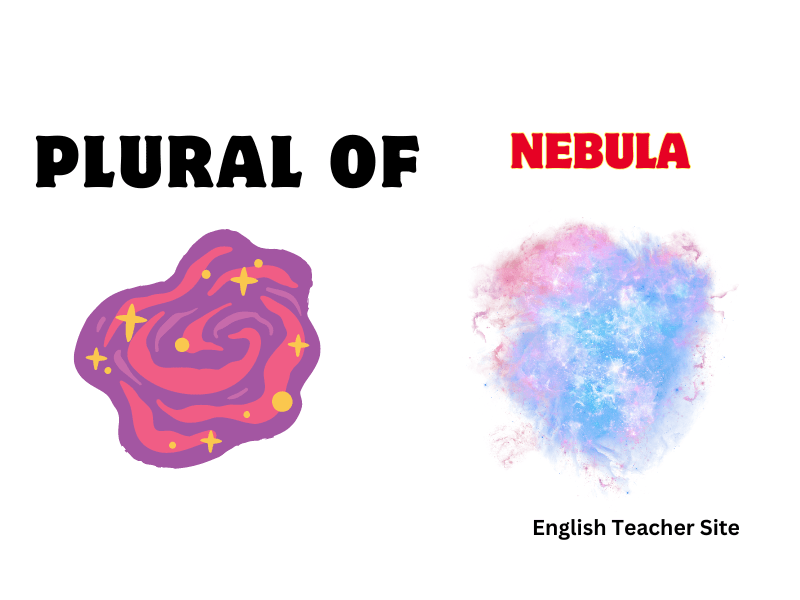What’s the Plural of Nebula: Unveiling the Correct Term

- The plural of “nebula” can be either “nebulae” or “nebulas.”
- “Nebulae” is the more commonly accepted plural form in scientific contexts.
- The term “nebula” is Latin in origin, influencing its pluralization.
When it comes to the language of astronomy and the cosmos, certain terms evoke a sense of wonder and curiosity. The word “nebula” is one of those terms—a single-word gateway to discussions about the vast, swirling clouds of gas and dust in space, which are often the birthing grounds of stars. However, even the most cosmic of terms adhere to grammatical rules. In the case of “nebula,” the question arises regarding how to properly pluralize this singular term.
What’s the Plural of “Nebula”?
The conventional plural form of “nebula” in Latin is “nebulae”. However, the anglicized plural “nebulas” is also widely accepted. Here’s a summary of usage for each term:
| Plural Form | Usage |
|---|---|
| Nebulae | Common in scientific communities |
| Nebulas | Common in general English |
To understand the usage context, the following points are helpful:
- Nebulae: Preferred in scientific contexts and among astronomers.
- Nebulas: More familiar to the general public and often used in more casual conversations about space.
- Observing the spiral arms of nebulae can provide insights into the birth of stars.
- Several new nebulas were discovered by the telescope last year.
What’s the Singular of “Nebula”?
The term nebula stands as the singular form. It refers to a vast cloud of gas and dust in space. Unlike its plural counterparts, nebulas or nebulae, the singular term nebula captures the essence of one such structure.
Origin of the Term “Nebula”
| Latin | English Translation |
|---|---|
| Nebula | Mist/Cloud |
Singular Usage in Sentences
- A nebula is the birthplace of stars.
- The Orion nebula is one of the most observed nebulae.
- Singular Form: Nebula
- Meaning: A single cloud of gas and dust in space
Defining the Word “Nebula”
A nebula is an astronomical term with roots in Latin, where it means ‘mist’ or ‘cloud’. In contemporary English, it refers to an interstellar cloud of dust, hydrogen, helium, and other ionized gases. These celestial bodies are often the birthing grounds of stars and planetary systems, making them significant in the study of cosmology and astrophysics.
Nebulae exist in various forms and are classified based on their properties and appearance. They can range from vast regions of ionized gas known as emission nebulae to reflection nebulae that shine by reflecting the light of nearby stars.
| Common Nebula Types | Characteristics |
|---|---|
| Emission Nebula | Glows due to ionized gases |
| Reflection Nebula | Reflects light from nearby stars |
| Planetary Nebula | Formed from the death of medium-sized stars |
| Dark Nebula | Contains dense dust blocking light from behind |
- Nebulae: This plural form follows the traditional Latin rule for nouns ending in ‘-a’.
- Nebulas: This version respects the modern English convention, adding ‘-s’ or ‘-es’ for plural nouns.
Nebulae are not only important in scientific contexts but have also captured the human imagination, featuring prominently in art and storytelling, highlighting our fascination with the cosmos.
Other Latin Nouns
In Latin, nouns are categorized by declensions, which are groups based on the ending of the noun’s genitive singular form. Each declension follows different patterns for singular and plural forms. Understanding this is vital when studying Latin as it affects how words are used and translated.
First Declension Nouns
First declension nouns primarily consist of feminine words and typically end in ‘-a’ in the singular nominative form, and ‘-ae’ in the plural. Here’s a basic illustration:
| Singular | Plural |
|---|---|
| porta (gate) | portae (gates) |
| terra (earth) | terrae (earths) |
| poeta (poet) | poetae (poets) |
Second Declension Nouns
The second declension contains nouns that are mostly masculine or neuter. Their endings vary: masculine nouns typically end in ‘-us’ or ‘-um’ in the nominative singular, while neuter nouns end in ‘-um’ in the nominative singular. Their plural endings are ‘-i’ for masculine and ‘-a’ for neuter nouns.
| Masculine Singular | Masculine Plural | Neuter Singular | Neuter Plural |
|---|---|---|---|
| lupus (wolf) | lupi (wolves) | bellum (war) | bella (wars) |
| servus (servant) | servi (servants) | regnum (reign) | regna (reigns) |
- In both declensions, the differences between singular and plural are distinctively marked.
Alongside the regular plural forms, the Latin language also holds examples where pluralization leads to a change in the base word:
- opus (work) becomes opera in the plural, emphasizing different forms with distinct meanings in translations.
- corpus (body) becomes corpora, denoting more than one entity.
Latin, with its structured approach to noun forms, provides a foundation for understanding the etymology and grammar of many modern languages. Its influence continues to be significant and is clearly observed in the sophisticated system of plurality in contemporary Romance languages. Latin’s precision in linguistic forms, a testament to its historical prominence, enriches our understanding of language development.
Examples of the Word “Nebula” Used in Sentences
Singular Usage:
- The Orion Nebula is one of the most studied and photographed objects in the night sky.
- A nebula often appears as a hazy patch when observed with telescopes.
Plural Usage:
- Several nebulae are visible with the help of powerful telescopes.
- The Hubble Space Telescope has captured stunning images of different nebulas.
In Educational Materials:
| Singular Form | Plural Form |
|---|---|
| A nebula can often harbor newborn stars. | Numerous nebulas enhance the beauty of our galaxy. |
| An emission nebula glows due to ionized gases. | Many nebulae have been cataloged in our Milky Way. |
In Literature and Culture:
- Writers often use nebulae as metaphors for mystery and creation.
- Nebulas often serve as backdrops in science fiction to convey vastness and wonder.
Grammar Tips:
- When choosing between “nebulae” and “nebulas,” consistency with scientific texts favors “nebulae.”
- Ensure verbs agree with “nebula” as a singular noun and “nebulae” or “nebulas” in plural form.
Examples of “Nebulae/Nebulas” Used in Application
Below are examples displaying the use of “nebulae” and “nebulas” to denote multiple nebular structures in space.
In Astronomy Textbooks:
| Nebulae | Nebulas |
|---|---|
| The Orion, Carina, and Eagle nebulae are some of the most studied regions in the galaxy. | The term “nebulas” can sometimes be found in less formal or modern texts to describe these same star-forming regions. |
Astronomers commonly present these cosmic formations in journal articles or educational materials, discussing the composition, distance, and significance of various nebulae/nebulas.
In Observational Guides:
- Amateur astronomers often seek out the luminous nebulae glowing in the night sky, each with its own distinct characteristics.
- Observational guides may provide charts and tips for locating and identifying such nebulas with telescopes or binoculars.
In Media and Popular Culture:
| Example of Nebulae in Media | Example of Nebulas in Media |
|---|---|
| “The breathtaking nebulae captured by the space telescope have inspired a generation of scientists.” | “Sci-fi movies frequently feature spectacular visuals of nebulas, adding to the wonder of deep-space exploration.” |
In Educational Resources:
- Schools utilize images and diagrams of nebulae to teach about life cycles of stars.
- Documentaries and online courses often include sections on the birth of stars within nebulae, highlighting their critical role in cosmic evolution.
Origin of the Word “Nebula”
The word “nebula” has Latin origins, where it originally meant “mist” or “cloud”. In the fascinating journey from its Latin roots to its current usage, the term has adopted various meanings and nuances.
Etymological Evolution:
| Century | Usage |
|---|---|
| 1600s | Medical term for cloudy formations in urine or films on the eye. |
| 1800s | Astronomical term for a cloud of gas or dust in space observable at night. |
Meaning Transition:
- Initially, nebula referred to any faint celestial object, such as galaxies or star clusters, due to their hazy appearance.
- The term has been refined over time to specifically denote clouds of dust and gas in space.
Astronomical Significance:
- In modern astronomy, the word “nebula” points to the majestic and often luminous clouds seen in the night sky.
- These nebulae are regions where new stars are born or the remnants of stars that have died.
The English usage of “nebula” in the astronomical sense dates back to the 19th century, coinciding with advancements in telescopic technology. This allowed clearer observation of these celestial phenomena, which previously appeared as mere blurry spots to the naked eye.
Plurals in English and Latin:
The English language has adopted two plural forms for the word “nebula”:
| Singular | Plural (English) | Plural (Latin) |
|---|---|---|
| nebula | nebulas | nebulae |
- Nebulas follows the standard English rule of adding an “s” to form the plural.
- Nebulae retains the original Latin pluralization, preferred in scientific contexts.
Sources
My name is Khamis Maiouf. I am the creator of the English Teacher Site, dedicated to providing valuable resources and insights for students around the world. With a passion for education and a commitment to helping students enhance their skills, I aim to make English teaching more effective and enjoyable for both educators and students.






